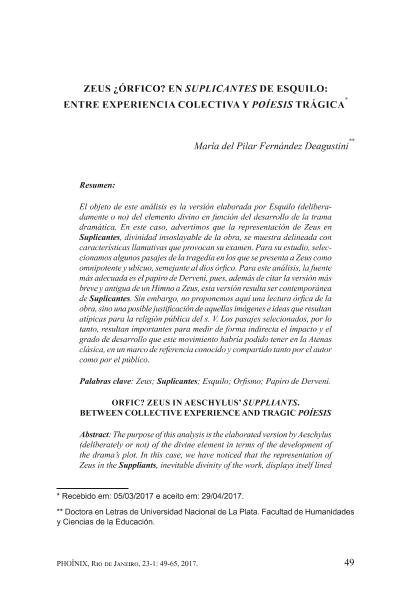Mostrar el registro sencillo del ítem
dc.contributor.author
Fernández Deagustini, María del Pilar

dc.date.available
2018-11-26T14:34:50Z
dc.date.issued
2017-06
dc.identifier.citation
Fernández Deagustini, María del Pilar; Zeus ¿órfico? en Suplicantes de Esquilo: entre experiencia colectiva y poíesis trágica; Universidade Federal do Rio de Janeiro. Instituto de História. Laboratório de História Antiga; Phoînix; 23; 1; 6-2017; 49-65
dc.identifier.issn
1413-5787
dc.identifier.uri
http://hdl.handle.net/11336/65121
dc.description.abstract
El objeto de este análisis es la versión elaborada por Esquilo (deliberadamente o no) del elemento divino en función del desarrollo de la trama dramática. En este caso, advertimos que la representación de Zeus en Suplicantes, divinidad insoslayable de la obra, se muestra delineada con características llamativas que provocan su examen. Para su estudio, seleccionamos algunos pasajes de la tragedia en los que se presenta a Zeus como omnipotente y ubicuo, semejante al dios órfico. Para este análisis, la fuente más adecuada es el papiro de Derveni, pues, además de citar la versión más breve y antigua de un Himno a Zeus, esta versión resulta ser contemporánea de Suplicantes. Sin embargo, no proponemos aquí una lectura órfica de la obra, sino una posible justificación de aquellas imágenes e ideas que resultan atípicas para la religión pública del s. V. Los pasajes selecionados, por lo tanto, resultan importantes para medir de forma indirecta el impacto y el grado de desarrollo que este movimiento habría podido tener en la Atenas clásica, en un marco de referencia conocido y compartido tanto por el autor como por el público.
dc.description.abstract
The purpose of this analysis is the elaborated version by Aeschylus (deliberately or not) of the divine element in terms of the development of the drama’s plot. In this case, we have noticed that the representation of Zeus in the Suppliants, inevitable divinity of the work, displays itself lined with striking features that cause its examination. To do this, we select some passages of the tragedy in which Zeus is presented as omnipotent and ubiquitous, similar to the orphic god. For this analysis, the best source is the Derveni papyrus, because besides including the oldest and shortest version of a Hymn to Zeus, that version is contemporary to the Suppliants. However, we do not propose an orphic reading of the work, but a possible justification of those images and ideas that are atypical for public religion of the fifth century b. C. The selected passages, therefore, are important to measure indirectly the impact and degree of development that this movement could have had in classical Athens, in a framework known and shared by both the author and the public.
dc.format
application/pdf
dc.language.iso
spa
dc.publisher
Universidade Federal do Rio de Janeiro. Instituto de História. Laboratório de História Antiga
dc.rights
info:eu-repo/semantics/openAccess
dc.rights.uri
https://creativecommons.org/licenses/by-nc-sa/2.5/ar/
dc.subject
Zeus
dc.subject
Orfismo
dc.subject
Suplicantes
dc.subject
Esquilo
dc.subject.classification
Estudios Religiosos

dc.subject.classification
Filosofía, Ética y Religión

dc.subject.classification
HUMANIDADES

dc.title
Zeus ¿órfico? en Suplicantes de Esquilo: entre experiencia colectiva y poíesis trágica
dc.title
Orfic? Zeus in aeschylus’ suppliants: between collective experience and tragic poíes
dc.type
info:eu-repo/semantics/article
dc.type
info:ar-repo/semantics/artículo
dc.type
info:eu-repo/semantics/publishedVersion
dc.date.updated
2018-10-22T20:18:16Z
dc.journal.volume
23
dc.journal.number
1
dc.journal.pagination
49-65
dc.journal.pais
Brasil

dc.journal.ciudad
Río de Janeiro
dc.description.fil
Fil: Fernández Deagustini, María del Pilar. Consejo Nacional de Investigaciones Científicas y Técnicas. Centro Científico Tecnológico Conicet - La Plata. Instituto de Investigaciones en Humanidades y Ciencias Sociales. Universidad Nacional de La Plata. Facultad de Humanidades y Ciencias de la Educación. Instituto de Investigaciones en Humanidades y Ciencias Sociales; Argentina
dc.journal.title
Phoînix

dc.relation.alternativeid
info:eu-repo/semantics/altIdentifier/url/http://phoinix.historia.ufrj.br/media/uploads/artigos/08-Artigo_Maria_del_Pilar.pdf
Archivos asociados
